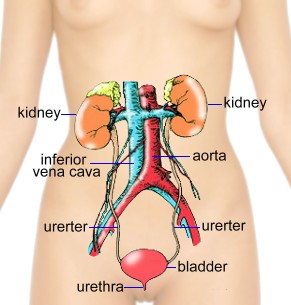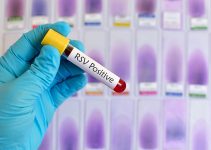What is Kidney Pain?
Kidneys are very essential to human body systems. It is very important to be very cautious if you feel a kidney pain. Kidneys play a very important role in the urinary system. Kidneys also regulate electrolytes, maintain your acid–base balance and help regulate blood pressure. Kidneys are also responsible for filtering the blood and removing wastes through the urinary system.
Many people sometimes mistake a pain caused by kidneys with back pain or middle back pain that is usually caused by muscles and ligaments problems. A kidney pain is normally felt in the flank area that is at the lower edge of the ribs on the side of the spine. If you feel a flank pain that tends to be severe and occurs in waves, that is most likely kidney pain. Kidney pain occurs anytime. Some people feel kidney pain in the morning. Others feel kidney pain at night and others feel kidney pain after eating.
Location of Kidneys (Anatomical)
In human anatomy, kidneys are located at the rear of the abdominal cavity. Kidneys lie between the muscles of the dorsal body wall and the peritoneal lining. They are on top of the adrenal glands which are protected by three layers of connective tissue and protected by collagen fibers. The right kidney is usually slightly lower than the left kidney.
Causes of Kidney Pain
Kidney Stone Pain
Most kidney pains are caused by kidney stones. A kidney stone is a solid mass that developed from too much substance (often salts) in the urine. The substances come out with tiny crystals which further become stones. Kidney stone pain occurs when a kidney stone grows at least two to three millimeters. At this time they are large enough to obstruct the ureter. Kidney stones that remain in the kidneys do not cause pain. It is only when they move through the urinary tract that severe pain follows. [6] The obstruction stretches the ureter and renal pelvis which causes pain. The tendency to develop kidney stones may be hereditary. If several kidney stones have developed, you may feel kidney pain on both sides. It is true that there are medications which can relieve the pain. However, that is only dealing with the symptom. To stop the pain it is essential to remove the kidney stones which are the origin of the pain.
Other Kidney Pain Causes
There are other reasons you may experience kidney pain besides kidney stones. One of these is a kidney infection[6] or bladder spasm in the kidney area. When a kidney is infected it is inflamed and that causes pain.
A kidney infection usually begins as a Urinary Tract Infection (UTI). It is more common among women. If the UTI is treated, the patient can prevent a more serious kidney infection (pyelonephritis). This kind of pain usually comes in waves and is accompanied by chills, fever and vomiting. The pain may also radiate up into the abdomen.
Kidney pains may also be due to kidney cancer. This is very rare. This kidney pain is piercing and very intense, like a migraine headache. Unlike other kidney pains, pain caused by a tumor on kidney is normally constant and dull. Kidney pain may not be felt severely if the tumor is detected and removed immediately. The person with kidney cancer needs to visit the doctor often to obtain proper treatment and to avoid reaching the level of severe kidney pains.
Kidney Pain Symptoms
If you experience what you think may be having kidney pains, go to your healthcare practitioner right away to have it properly diagnosed. That is the best way to be proactive and prevent further complications. You should recognize the signs and symptoms that suggest kidney pain, most especially kidney stone pain.
Because kidney pain and back pain have similar signs, pay special attention to the location of the kidneys. They are located below your diaphragm on the left and right side, towards the back of your abdomen. Pain starting there and radiating to the sides (flanks) are quite often a sign of kidney pain. If you have signs of blood in your urine. Do not hesitate. Go to your doctor for a diagnosis by performing a urinalysis. [3]
You should know your family health history. That will be a part of helping the doctor diagnose your kidney pain problem. If other family members ever had kidney stones, it is another sign that yours my be the same kind of symptoms. There is a slight difference in the types of kidney pain experienced by men and women. Men are most known for having kidney stone attacks which cause significant pain as the stones are painfully excreted through the ureter. Women, on the other hand are more likely to develop other problems related to kidneys.
Kidney stone pain is extremely painful, sharp and stabbing. This is concentrated on one side and the level of pain is continuous and goes in waves. You may find relief for a while by taking an analgesic or other pain reliever. However, if the pain radiates again after few hours and the location of the pain becomes more definite, then surely this is one symptom of kidney pain. If it continues, or is accompanied by a fever or other changes in your urine, it is almost surely kidney pain. Go to your doctor.
Kidney pain during pregnancy is harder to address. Sometimes pregnant women have been known to confuse kidney pains with their labor pains. This is especially true for a first pregnancy.[5]
Treatment for Kidney Pain with Chronic Kidney Disease
Common sense tells people that the best treatment for kidney disease is to not get it — prevention. The question is, “What are some ways you can protect your kidneys from being damaged or overworked?”
Recognize the fact that your kidneys are the major filters in your body, so it makes sense to:
- Avoid drinking or eating toxic substances.
- Minimize your salt and potassium intake.
- Monitor your phosphorus intake.
- Eat a healthy diet and
- Do not overload your system with too much protein.
- Quit smoking.
- Avoid alcohol, or keep it to a minimum.
- Get regular exercise.
- Try not to take medicine (like NAISDs) that are known to damage kidney functions.
- Avoid dehydration. Drink what you need.
If you are diabetic or have high blood pressure be aware that those health conditions make you more vulnerable to kidney disease. [7]
When to See Your Doctor for Kidney Pain
As you can see, there are many causes for kidney pain besides kidney stones. Probably the most essential thing for people to know is when is it really critical to get to see your doctor right away.These combined classic symptoms demand immediate attention:
- Dull, one-sided and constant pain in your back or flank.
- Fatigue, fever and body aches.
- A recent urinary tract infection.
This is why. If you get a blood clot in your kidney or a hemorrhage, it can create sudden pain in your lower abdomen and possibly blood in your urine. No matter what causes this, it is interrupting the circulation to your kidney and THAT is an emergency. Get to a doctor right away, even if your urine is not bloody.
Possible causes for this could be complications from a kidney infection or injury or other kidney diseases or disorders. These may include: a kidney embolism, atherosclerosis of the renal artery or some other bleeding disorder. [8]
If you experience kidney pain and seek medical attention, as advised, you will probably learn some new words. For instance, renal physiology refers to how the kidney functions. It does not define any disease or condition. On the other hand, nephrology is the medical specialty the gives particular attention to kidney diseases. [1]
References:
- http://en.wikipedia.org/wiki/Kidney
- http://www.medhelp.org/medical-information/show/9/Kidney-stones
- http://www.essortment.com/all/kidneystones_rclg.htm
- http://www.medicinenet.com/kidney_pain_symptoms_and_causes/views.htm
- http://pregnancypainrelief.com/types-of-pains-2/kidney-pain/kidney-pain/
- http://www.mayoclinic.com/health/kidney-pain/MY00125
- http://www.kidneypain.net/treatment.html
- http://www.mayoclinic.com/health/kidney-pain/MY00125/DSECTION=when-to-see-a-doctor



